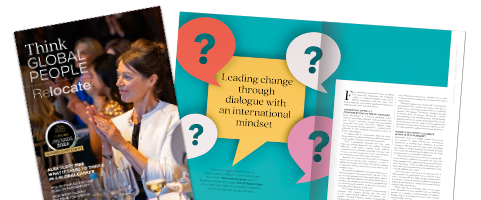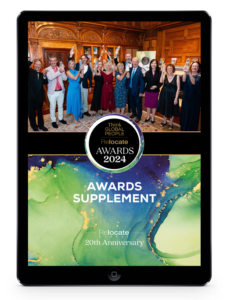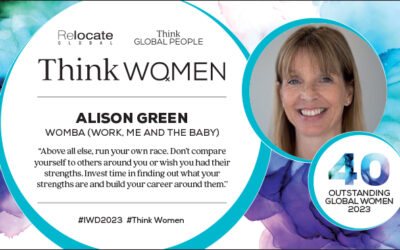Developing your career in an international role
What are the personal attributes needed to thrive and succeed in a global career? Pioneering professional athlete turned broadcaster Alex Scott MBE shared what she has learnt so far with Christine Armstrong at the opening keynote of the HR Technologies conference. Ruth Holmes reports.
(Image: Conor Molloy/ProSports/Shutterstock)
Pivoting to new careers, bringing people with you, staying humble, speaking up and taking opportunities are the life lessons Alex Scott, the former international professional footballer, shared at her opening keynote at the future-focused HR Technologies UK conference.
Progressing from playing in a concrete football cage in Poplar, east London, to broadcasting pitch side from some of the world’s most iconic football stadiums, Alex is well-placed to talk of the skills and attributes needed to thrive in the future international workplace.
Blazing a trail
Alex Scott began playing football just down the road from the ExCel venue. It was from here, back in the early 1990s, that youth worker Edwin Lewis encouraged her to try for the Arsenal Women’s youth team. Scott recalled how at this point she knew nothing about women’s or girls’ football teams because there were no female role models to follow. Yet aged eight, she was signed by Arsenal, a shy girl with a speech impediment and dyslexia who found school daunting, but who loved playing football. Since then, Scott has gone on to become a role model for girls around the world.
“From the outside, it might all look smooth sailing,” said Scott, after talking about her career highs, including 140 England caps, 19 team trophies and inauguration into the National Football Museum’s Football Hall of Fame. “The reality is I worked in the Arsenal laundry scrubbing [her now-colleague at the BBC] Ian Wright’s shorts. This was part of my growth. I got to be around people like Arsène Wenger. It’s been about switching a negative to a positive.”
Gender inequalities are perhaps most stark in the culture and structures of professional football. Scott recounted that despite her and her team’s significant successes, she was unable to use Arsenal’s Highbury stadium to speak officially as captain. The gender pay gap is also huge in women’s football. Many women players are still paid very little, if at all, across much of the sport, despite more professional contracts being offered among top-tier teams.
It’s on issues like these Scott has to discern when to speak up and use her voice and when to keep quiet. “It depends on the environment,” she explained. “If I’m learning, I’m listening because I need to understand before I can give advice.
“In terms of speaking out, then it’s about my values and what I stand for. I could be here pretending that Arsenal and the WSL [FA Women’s Super League] were all great. But how we travelled to games and were paid shows then and now we are not there yet. This has led to the Lionesses talking about their commercial worth and paying women more generally and continuing to fight for this.”

International exposure and personal growth
Staying true to her values has defined key moments of Scott’s career and her leadership. It has also helped to determine her legacy, team culture and performance. The end of her playing career and captaincy came in 2018 after a season that had seen Alex largely on the bench.
A farewell match was the last chance for her to make the starting line-up, but this did not sit well with Alex. “I hadn’t played much that season and then I found myself taking the place of someone who was in better form than me.” She made the hard decision to take herself out of the equation, being more mindful of the message she wanted to send to the team.
Her experience at the Women’s Professional Soccer League in the US and the squad’s mentality at her team in Boston were important in this respect. The transition to professional football in America aged 23 meant leaving Arsenal for the first time in 2009 (she had three spells with the club), stepping out of her comfort zone and “pitting [her]self against the best”.
“I loved my time in America. It made me grow as a human and it was an awesome environment to be in. What I learnt most from the experience is that I love the mentality of football in America. They want to be the best and they are unapologetic about it. I was drafted into Boston and I wanted to be the best right-back player in the world.”
But the best right-back in the world, Heather Mitts, was also in the Boston squad. Scott eventually realised her ambition. But this was not before the team culture of supporting and coaching each other to be the best they could be saw Heather Mitts help Alex Scott to achieve her aim.
“I was able to do the same with Lucy Bronze,” said Scott. “I played with fear for my place on the team every time I played for England. I was scared for my shirt, so it was my turn then to help Lucy become the best in the world as Heather had done for me.”
Growth mindset
Alex Scott firmly believes that world-class performances depend on mindset as well as skills, teamwork and professionalism. “Sometimes our mindsets can hold us back. It’s easy to ask, ‘what if it doesn’t work?’ Why not ask, ‘what if it does work?’ I had the offer of a contract for Arsenal, but I knew I wanted to help women’s sports development and on a new platform, so I knew that riskier option was one that I had to fight for.”
Knowing what you bring and add to the team is critical for backing and believing in yourself. “I’m big into self-development and imposter syndrome is a huge thing for me in that I’ve learnt that I don’t ever want to lose it. The moment I feel entitled when I walk into a room is the moment I lose it on this journey from playing in a football cage in east London to sitting next to Taylor Swift and Bono on a sofa on the ‘Graham Norton Show’.
“If I’m going to do something, I’m always going to do it in the right way,” she continued. This includes transitioning to a career in TV after a highly successful football career by studying for a degree in professional sports writing and broadcasting. “It’s about believing in yourself.”
Her advice for people wanting to change career is to “go and find those people who have already made that transition” and learn as much as you can about all aspects of what it is you want to do, which helps you understand other people’s roles and where your role fits in.
“I also knew that getting into TV and being one of very few women, I didn’t want to be on my own, so I always try to leave the door open to others behind me. Now there is a whole raft of former sportswomen who are now presenters.”
For Scott, this focus on bringing others with you means being generous with your contacts and putting people in contact with each other where it is mutually beneficial. It also means letting your work do the talking while developing yourself and excelling. This is especially helpful in situations where people look to detract; something Alex Scott’s high profile has seen her contend with.
“I’ve always known I represent more than myself,” she says. “It’s much bigger. It’s about women in society and rising above unfair or negative comments. I have a platform and it’s about finding ways I can deliver my message.”
Read about award-winning global mobility, leadership and education in the upcoming Summer issue of Think Global People magazine, which will reveal the teams and organisations being celebrated in the Relocate Think Global People Awards 2024. Secure your copy here.
Have you heard about our Think Global People community?


 Magazine
Magazine


